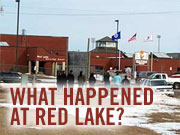March 25, 2005
 |
| St. Mary's Catholic Mission in Red Lake will host funerals of several Red Lake shooting victims. The church combines symbols of spirituality from Native American beliefs and the Catholic faith. (MPR file photo) |
Bemidji,Minn. — Police officers, firefighters and citizens of Red Lake saluted Thursday night as a procession passed, carrying the body of a longtime tribal officer shot dead by his grandson.
It was the beginning of a two-day wake for Daryl Lussier, 58, and his longtime companion Michelle Sigana, 31, who will be remembered in a joint funeral service on Saturday. They were among nine people shot to death Monday before Jeff Weise took his own life.
Police officers lined the sidewalks outside the Red Lake Humanities Center, saluting as the caskets were unloaded from hearses and brought inside, placed between flowers and candles. Some people hugged and cried as they pressed close to the caskets.
Lussier was dressed in his police uniform with his hat placed on his hands. An American flag was folded in a triangle and placed near his head. A crucifix hung in his casket, as it did in Sigana's. Two huge flags hung on the wall behind the caskets -- one American, one Red Lake Nation.
For two days, people will come and go, but someone will always remain with the bodies.
Funerals for Daryl Lussier, Michelle Sigana and Chase Lussier will be Saturday at St. Mary's Catholic Church in Red Lake. The mission church is one of several on the reservation that will be busy with funerals.
For many people, a funeral is a ritual for the living -- a time to share grief. In Red Lake, that ritual will take on added significance.
Father Bill Mehrkens spent more than a decade at St. Mary's Mission in Red Lake. It was his last assignment before retiring six years ago. Everyone calls him Father Bill. This weekend, he'll be going back to Red Lake to lead services and comfort friends.
When Father Bill thinks of Red Lake, he's reminded of an old movie.
"'The Agony and the Ecstasy.' There's a lot of pain, a lot of sickness and also a lot of love -- a lot of goodness and beauty in their lives. And I have a lot of respect for Native American traditions," says Mehrkens.
Mehrkens notes the Ojibwe people believe that all things are related. He thinks one way to unite the Red Lake and Bemidji communities is to pray together. Mehrkens believes the traditions of the Ojibwe are in complete harmony with Christianity.
"A medicine man up there, Tom Stillway, and I, got to know one another when I was living up there. Tom and I have a respect for each other. One of the first years I was up there, he said, 'Well, Father Bill, you and I believe in the same God," says Mehrkens.
Mehrkens says prayer is an important part life for the Ojibwe people. He thinks now is a good time for people from both cultures to pray together.
There will be prayers and ceremonies at the services, says Brenda Child, who grew up on the Red Lake reservation, and now teaches Native American history at the University of Minnesota. Child thinks because the victims are so young, Red Lake will be an incredibly sad place this weekend.
"More often, you're at the funeral of older people, and there is sometimes a bit of joy that even accompanies those funerals, because people will tell stories about loved ones who have passed away. And I think these are going to be tremendously sad wakes and funerals," says Child.
Now is the time the tribe will support the family of the deceased. There will be gifts of money and food. People will help the families with day-to-day chores.
But the wakes and funerals will not mark the end of the grieving. According to tribal custom, after the death of a loved one, a year of formal mourning follows.
"There will be memorial feasts given by the families, and often what we call giveaways, where presents are given to people who supported you through your difficult time," says Child.
After the year of mourning, the Red Lake community will need to move on. Father Bill Mehrkens thinks that will be difficult. He says the hurt and pain from the tragedy is going to last for generations.
(The Associated Press contributed to this report)






